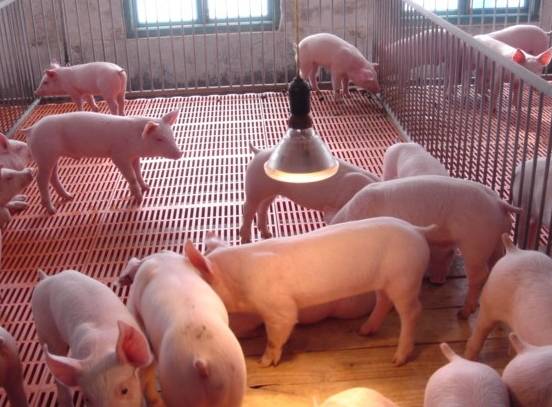Hayden E Williams, Jason C Woodworth, Joel M DeRouchey, Steven S Dritz, Michael D Tokach, Robert S Fry, Matt E Kocher, James L Usry, Robert D Goodband
A total of 140 weanling pigs (241 × 600, DNA, Columbus, NE; initially 5.5 ± 0.79 kg body weight) were used in a 32-d study evaluating the effects of increasing dietary Fe from either iron sulfate (FeSO4) or iron carbonate (FeCO3) on nursery pig growth performance and blood Fe status. The pigs used for this trial did not receive an Fe injection after birth in order to increase the sensitivity to added dietary Fe after weaning. Pigs were weaned at approximately 21 d and allotted to pens based on the initial weight in a completely randomized block design with five pigs in each pen and four pens per treatment. Experimental treatments were arranged as a 2 × 3 + 1 factorial with main effects of dietary Fe source (FeSO4 vs. FeCO3) and level (10, 30, or 50 mg/kg of added Fe) plus a negative control with no additional dietary Fe. The basal diet contained 40 mg/kg total dietary Fe based on ingredient contributions and was formulated with an Fe-free trace mineral premix. Experimental diets were formulated below the pigs recommended Fe requirement based on NRC (2012) estimates. Experimental diets were fed in pellet form in a single phase for the duration of the trial. From day 0 to 32, there was no evidence for source × level interactions for growth performance, hemoglobin (Hb), or hematocrit (Hct) values. There was no evidence for a difference (P > 0.10) in dietary Fe source. Providing increasing Fe levels in the diet from either FeSO4 or FeCO3 improved (P < 0.05) average daily gain, average daily feed intake, gain-to-feed ratio, and increased (P < 0.05) Hb and Hct values. A day effect (P = 0.001) was observed for both Hb and Hct with values increasing throughout the study. Increasing dietary Fe levels in the diet from either FeSO4 or FeCO3 increased (linear; P < 0.05) Hb and Hct values on days 14, 21, and 32. In summary, these data suggest that the micronized form of FeCO3 is a source of Fe that can be added to nursery diets to yield similar responses to those observed from FeSO4 supplementation. Similar to previous research, increasing dietary Fe improved the growth performance and increased Hb and Hct values when pigs have low Fe status at weaning.
 2020. J. Anim. Sci. 98(7): skaa211
2020. J. Anim. Sci. 98(7): skaa211
DOI:https://doi.org/10.1093/jas/skaa211
Registration hotline: 021-57634675
fax: 021-57632800
Copy right : 上海亘泰实业集团
Collaboration & Sponsorship: 021-57634938 57631012
ASASHotline:021-67868428
Site Map | CNZZStatistics
address:Shanghai songjiang jiuting town nine new highway 90 lane 3 nine new commercial building 15 floor

WeChat ID:asaschina
The pig nutrition international BBS CSIS